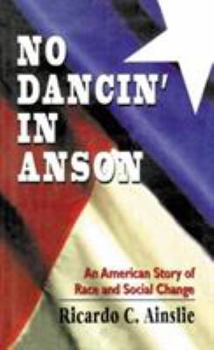No Dancin' in Anson: An American Story of Race and Social Change
Select Format
Select Condition 
Book Overview
A story of a community's struggle with its ethnic transformation. The book's portraits of individuals provide an engagement with the complexities of ethnic tensions. It examines the difficulties in... This description may be from another edition of this product.
Format:Hardcover
Language:English
ISBN:1568215851
ISBN13:9781568215853
Release Date:January 1995
Publisher:Globe Pequot Publishing Group Inc/Bloomsbury
Length:342 Pages
Weight:1.25 lbs.
Dimensions:1.1" x 5.9" x 8.5"
Customer Reviews
1 rating
A study of social change after the civil rights movement.
Published by Thriftbooks.com User , 26 years ago
Anson, Texas, a small community north of Abilene, plunged into turmoil when a parent group (soon to be know as Footloose) came together to address concerns about their teenage children. As in other farming communities, the free time of many teens was spent drinking and "parking." To provide chaperoned activities appealing to adolescents, Footloose began to plan a dance. Immediately they found themselves head-on with an ordiance banning dancing with the city limits. Initiated in the 1930's by an influential fundamental group, this city ordinance continued to concur with the religious beliefs of the present day community leaders. The church's power in the community provided a formative voting constituency; and the connection between religious affiliation, economy and social power had prevailed for years. The Footloose group, on the other hand, comprised a force of relative new comers to the community. Imagine the implosion! The controversy was not what drew Dr. Ricardo Ainslie to Anson, yet it proved a tremendous back drop for his story of racial and social change. His book explores the events following the civil rights legislation of the early sixities complicated by a declining economy and the infusion of agricultural technology. Ainslie observes the racial interaction of the traditional white farming community, dealing with an ever growing Mexican-American population. Thorough research and extensive interviews with sixty of Anson citizens illustrates this often uncomfortable dichotomy. Ainslie graphically tells of the emergence of change, using sensitive respect for the people caught in the winds. He is able to convey the benevolence in the worn faces of those who tell of hard times, laughter, and life's discourse. His descriptive writing parallels that of successful novelists. The reader can easily visualize Anson with its pick-up trucks, hometown cafe, and farming "contraptions" resting near the dusty roads, an infusionof Spanish colloquialism brings the characters of Anson alive. After telling the "Dancin" story, Ainslie shares insights from six of Anson's unique personalities. Their diverse background creates an awareness that allows the reader to see the inevitability of conflict. One becomes involved in personal reflections of the civil rights movement and the consequent "Act" that altered the American way of life. The frustrating chain of events in Anson reiterates the strength of long held beliefs (about race, culture, and religion) gleaned from childhood. This book is an intriguing look at the deeper levels of social activity, and clarifies how seemingly "small acts speak to larger issues." Change brings to the surface each person's inner-struggle for identify. Ainslie writes of the natural resistance to change and how even in the midst of it we can only see what we want to see. Acceptance of change is a slow and arduous process. In this somewhat de





